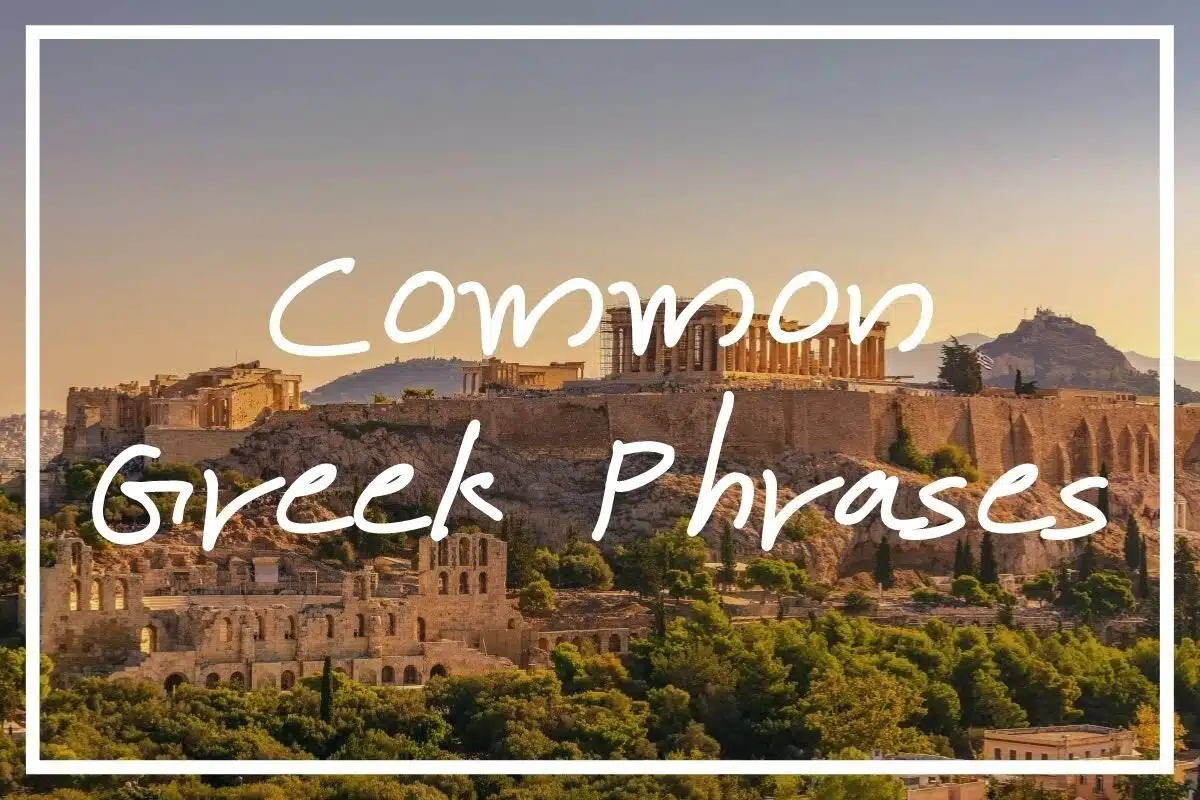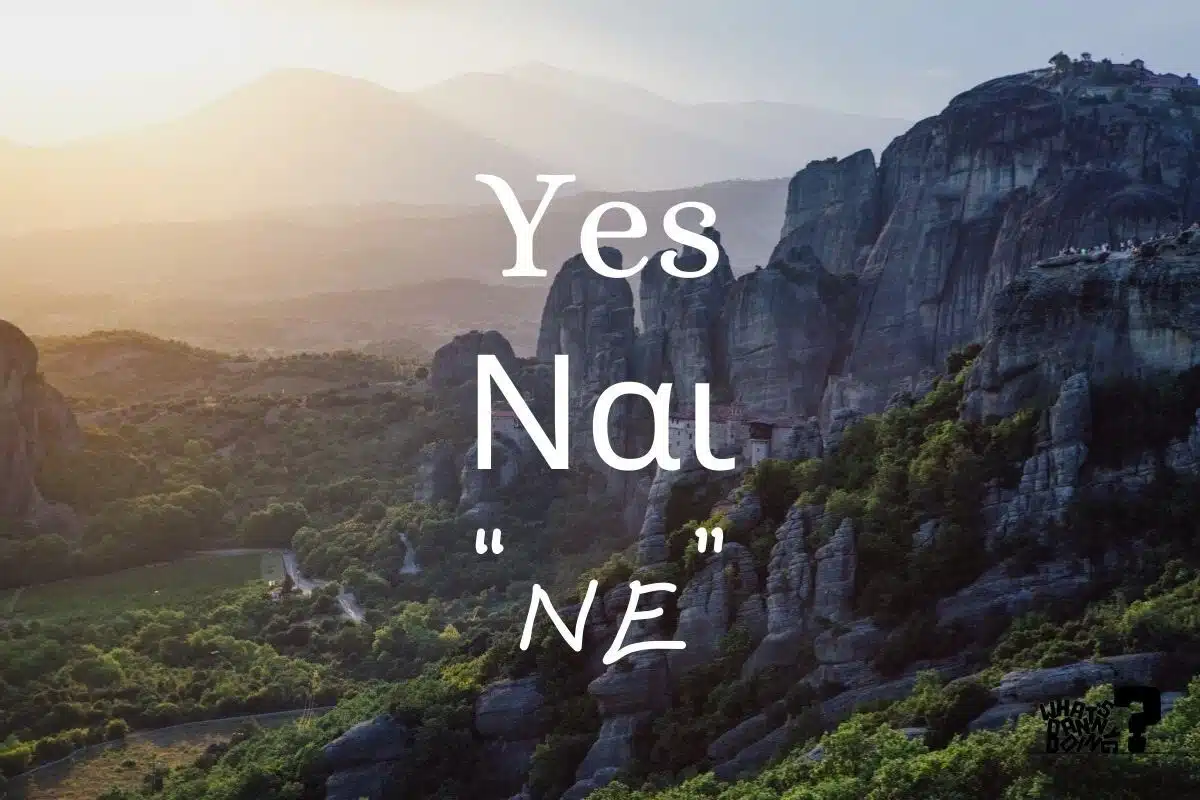
Are you looking for common Greek phrases to learn for your trip to Greece? I hope this post helps!
I was lucky enough to travel around northern Greece a few years ago.
It was an epic trip, and the country itself was as beautiful, ancient, and intoxicating as you’d expect!
If you’re planning a trip there any time soon, then I’m incredibly jealous.
You’re going to have a blast.
However, it’s worth learning a few of the local words before you go!
The language isn’t the hardest to pick up, but it definitely pays to have some common Greek phrases up your sleeve.
You’ll be able to move around easier, get on better with the locals, and make yourself understood with less frustration!
To help, I thought I’d dig up some of the Greek I learned on my travels and put together a post with 20 basic Greek words, Greek greetings, and phrases that should come in handy while you’re away.
Here we go then: 20 Greek greetings and basic Greek words/phrases to memorize!
Interested in greetings in Greek? You might also like these…
- How to Say Thank You in Every Country
- 101 Ways to Say Good Luck On Your New Journey
- 30 Awesome Synonyms for Wanderlust
- How to Say Friend in Different Languages
- 20 Benefits of Solo Travel
- 50 Fascinating Facts About Travel
- 75 Essential Things to Pack for Travel
- Key Features of the Experience of Travel
- 100 Reasons I love to Travel (& You Will Too)
20 Common Greece Greetings, Words, and Other Useful Phrases
1. Greek for Hello and Goodbye:
You can say hello in Greek in a formal and less formal way.
The informal way is:
- Γειά or Γειά σου, pronounced “Yee-a” or “Yee-a su”
The formal way is:
- Γεια σας, pronounced “Yee-a sas”
The best part? You use the same words to say “goodbye”! That’s one less Greek word you have to remember.
2. See you later in Greek
If you’re looking for a more relaxed way to say farewell, try:
- Tα λέμε, pronounced “Ta LE-me”
3. Good morning in Greek
The Greek for “good morning” was probably the word I used most frequently while travelling around.
- Written down in Greek, it’s: Kαλημέρα, or kaliméra.
- It’s pronounced “ka-lee-ME-ra”.
4. Good afternoon in Greek
One thing I liked about Greek greetings was that the root of how you say “good morning”, “good afternoon”, and “good night” stays the same.
It made memorising each word much simpler!
- Good afternoon is written: καλησπέρα, or Kalispéra.
- It’s pronounced, “ka-lee-SPE-ra”.
Heads up, you can also say this for “good evening”.
5. Good night in Greek
- The word for good night is καληνύχτα, or kaliníhta.
- It’s pronounced, “Ka-lee-NEE-ta”.
Here’s the Greek for “how are you?”
6. “How are you” in Greek
The Greek for “how are you” differs depending on who and how many people you’re talking to.
- The singular version is Τι κάνεις, pronounced “Ti KA-nees?”
- The plural form is Τι κάνετε, pronounced “Ti KA-ne-te?”
Heads up, the plural form is more respectful and often used if you’re talking toward older folks you meet.
7. Thank you in Greek
One of my favourite words, the Greek for thank you is: ευχαριστώ, or efharistó.
It’s pronounced, “ef-hari-STO”.
8. You’re Welcome in Greek
- A fun word to say, the Greek for “you’re welcome” is written παρακαλώ, or parakaló.
- You pronounce it “pa-ra-ka-LO”.
9. The Greek Cheers
I remember a night in Athens where our Greek hosts took us out to dinner.
To accompany the meal, they ordered a big carafe of this famous Greek spirit. It was either ouzo or raki, but, whatever it was, it did the trick!
We were drunk as a skunk by the end of the night, mainly because they displayed that infamous Greek hospitality and continuously topped up our shot glasses, refusing to take no for an answer…
Each time we’d do a shot, we’d shout, “yia mas!”
Ironically, given how drunk we were, it means “here’s to health”.
However, you use it as the Greek “cheers” whenever you’re having a drink with someone and doing a toast! It’s pronounced “yamass”.
10. Please in Greek
This one should look familiar!
The Greek for “please” is the same as “you’re welcome”.
- So, it’s written: παρακαλώ, or parakaló.
- And you pronounce it, “pa-ra-ka-LO”.
Saying “Yes” in Greek sounds a lot like saying “No” in English!
11. Yes in Greek
Confusingly, the Greek word for “yes” looks and sounds a lot like the English word for “no”!
- It’s written: Ναι, or nai.
- It’s pronounced, “NE”.
12. No in Greek
“No” is nice and simple too.
- It’s written: Οχι, or oxi.
- It’s pronounced, “O-hee”.
13. Sorry in Greek (or Excuse me)
I’m fairly confident I’m right in saying that the Greek words for “sorry” and “excuse me” (as in, “Excuse me, can I get past please”) are the same.
- It’s written: Συγγνώμη, or syngnómi.
- It’s pronounced, “See-GNO-mee”.
14. I Don’t Understand in Greek
A useful Greek phrase to have up your sleeve in a bind, “I don’t understand” is written:
- Δεν καταλαβαίνω, or Den katálaveno.
- It’s pronounced, “Den ka-ta-la-VE-no”.
15. Do you speak English in Greek
Here’s another one you might be using quite a bit on your trip!
- The Greek phrase for “do you speak English” is: Mιλάτε Αγγλικά, or Milate Anglika.
- It’s pronounced, “Mee-LA-te a-glee-KA”.
Next up: the Greek for “can you help me?”
16. Can you help me in Greek
This is a good phrase to know when you’re lost in Athens, searching for your hostel, or desperate to find the best gyros in town.
- “Can you help me” is written: Μπορειτε να με βοηθησετε, or Boríte na me voithísete?
- It’s pronounced, “Borehs-na-me-voy-thesis”.
17. How much does this cost in Greek
Make sure you remember this one for when you find yourself souvenir shopping or indulging in some retail therapy while you’re away.
- “How much does this cost” is written: Πόσο κάνει αυτό, or Póso káni aftó?
- It’s pronounced, “Poh-zo-CAR-nee”.
18. My name is In Greek
If you ever need to introduce yourself while you’re in Greece, say:
- “To O-no-ma mou EE-ne…” followed by your name.
- It’s written: To όνομα μου είναι, or to ónomá mou eínai.
Want something simpler? Another way to say this in Greek is:
- “Me lene [insert your name here]”, pronounced “meh-LEH-neh”.
19. What’s Your Name in Greek
Having told the lovely Greek person you’re talking to your name, you can respond by asking them:
- “POS se LE-ne?”
If there’s more than one person or the situation calls for something more formal, though, you’d ask:
- “POS sas LE-ne?”
In Greek, these are written Πως σε λένε (or pos se léne) and Πως σας λενε (or pos sas léne), respectively.
20. Two beers please in Greek
Last but definitely not least, asking for two beers is pronounced:
- “Theeo BEE-res pa-ra-ka-LO”
- Written down, it’d look like this: Δυο μπύρες παρακαλώ, or dhio birres parakaló.
Bonus: Where is the bathroom in Greek
Oh, and when you’ve finished those two beers, you might want to ask the bartender:
- “Pu EE-ne to BA-nio?”
That’s, “where’s the bathroom?” in Greek.
- You write it Που είναι το μπάνιο, or poú eínai to bánio?
Time to Memorize These Common Greek Phrases
There you have it, then:
20 common Greek phrases that should prove useful when you’re travelling around this beautiful country!
Whether you’re exploring one of the infamous islands, visiting the endless ancient attractions, or hiking through its many natural wonders, these Greek greetings and words are sure to make a difference.
Want to add to your travel vocabulary?
Here’s how to say friend and friendship in 65 different languages!



